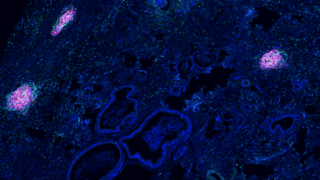Tag: Drugs
Search News
Categories
Archives
AI algorithm identifies most effective drugs for liver cancer
1st November 2021
Researchers from Barts Cancer Institute at Queen Mary University of London and King’s College Hospital have shown that a new computer-based algorithm can rank drugs used to treat primary liver cancer, based on their efficacy in reducing cancer cell growth.
Read moreImmune cells assemble – boosting the effects of chemotherapy in pancreatic cancer
9th July 2021
A new study from Barts Cancer Institute, Queen Mary University of London, has demonstrated that immune cells can be stimulated to assemble into special structures within pancreatic cancer such that, at least in a pre-clinical model, researchers can demonstrate an improvement in the efficacy of chemotherapy.
Read moreStudy suggests blood test could guide precision treatment in bladder cancer
16th June 2021
A blood test that can detect tiny amounts of circulating cancer DNA may be able to identify risk of cancer recurrence and guide precision treatment in bladder cancer following surgery, according to a clinical study led by Professor Tom Powles from Barts Cancer Institute at Queen Mary University of London and Barts Health NHS Trust. The findings from the study, published today in Nature, may change our understanding of cancer care following surgery.
Read moreResearchers use machine learning to rank cancer drugs in order of efficacy
25th March 2021
Researchers from Barts Cancer Institute, Queen Mary University of London, have developed a machine learning algorithm that ranks drugs based on their efficacy in reducing cancer cell growth. The approach may have the potential to advance personalised therapies in the future by allowing oncologists to select the best drugs to treat individual cancer patients.
Read moreNew class of drug reduces risk of death in bladder cancer
15th February 2021
A new type of drug that helps target chemotherapy directly to cancer cells has been found to significantly increase survival of patients with the most common form of bladder cancer, according to results from a phase III clinical trial led in the UK by Professor Tom Powles from Barts Cancer Institute, Queen Mary University of London and Barts Health NHS Trust.
Read moreResearch highlighted in ASCO annual report on progress against cancer
2nd February 2021
Research led by Professors Peter Schmid and Thomas Powles from Barts Cancer Institute, Queen Mary University of London, has been selected by the American Society of Clinical Oncology (ASCO) for inclusion in the Clinical Cancer Advances 2021, the Society’s annual review of progress against cancer. The notable studies, which investigated the use of immunotherapy in the treatment of triple negative breast cancer and advanced bladder cancer, are featured as two of many remarkable milestones in clinical cancer research and care.
Read more




